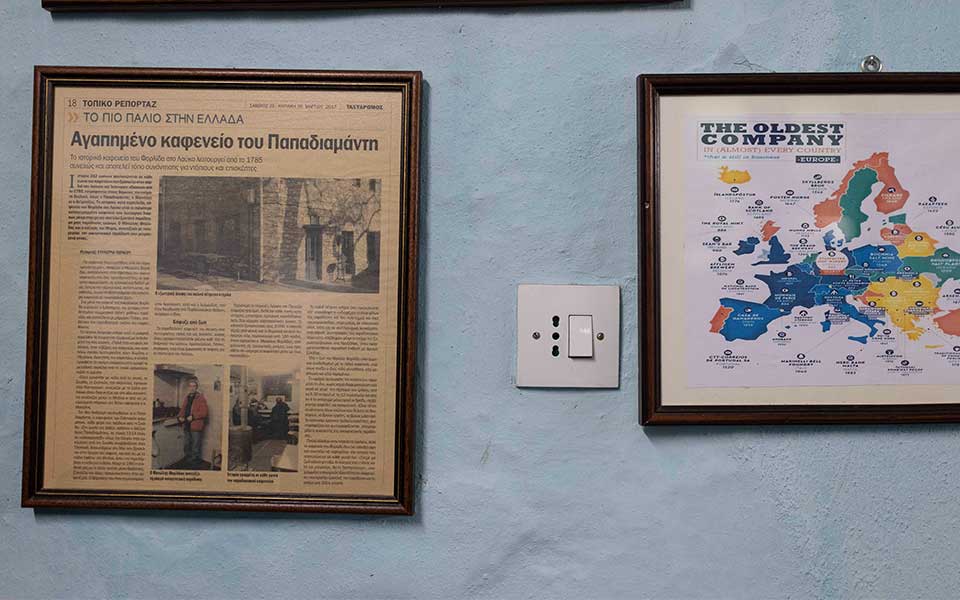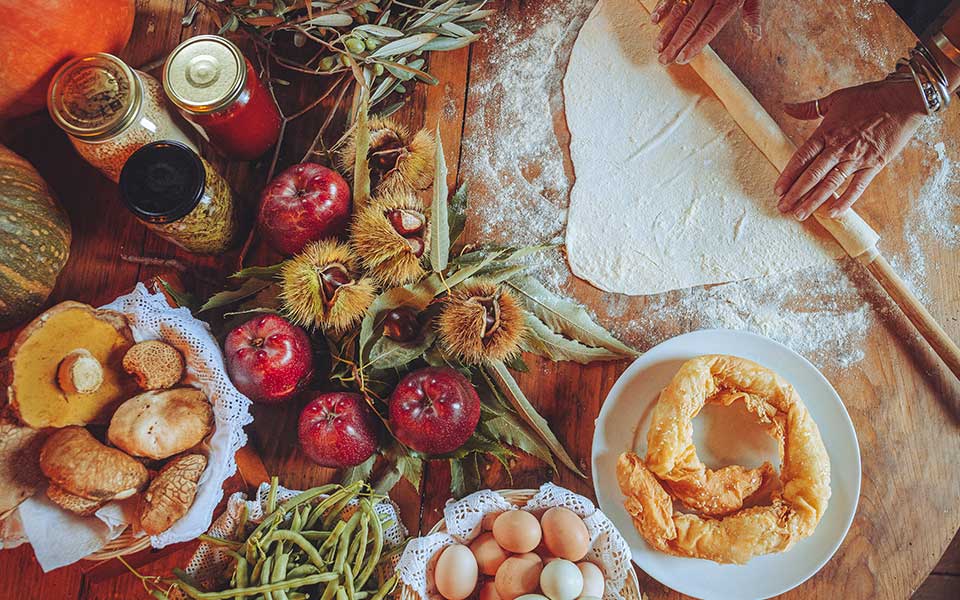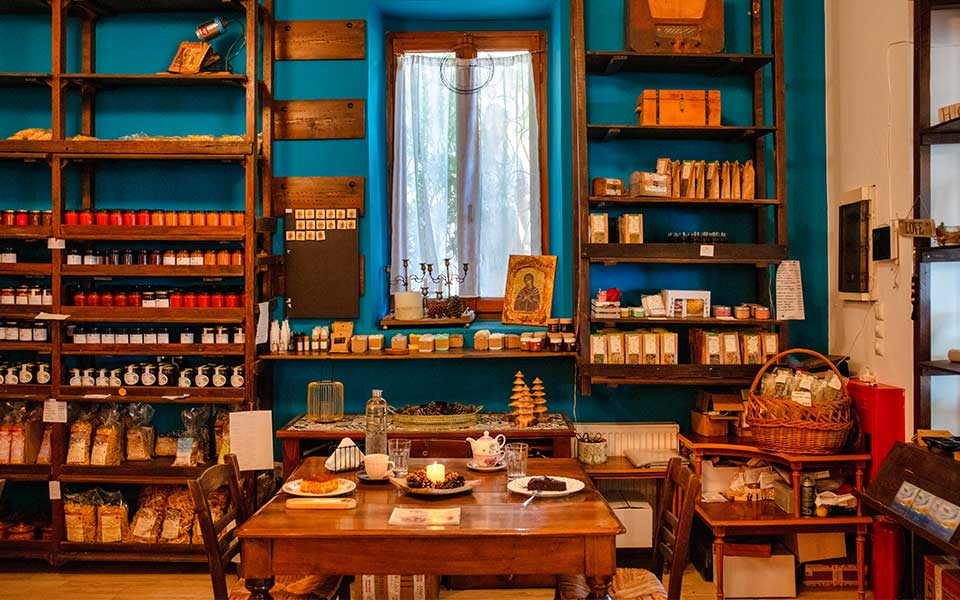Kefeneio Forlidas, Lavkos
At Forlidas, patrons still read newspapers, play traditional Greek card games or backgammon, and turn their chairs so they can see and chat with everyone, even if they’re sitting alone at the marble tables near the wood stove.
“A café with 240 years of history! Since 1785, we’ve never closed a single day, except for one small renovation and then during the pandemic,” says Manolis Forlidas, the owner of Greece’s oldest continuously operating café, located in Lavkos, southern Pilio.
Info
Kefeneio Forlidas, Lavkos
Tel. (+30) 24230.650.29

© Dimitris Tosidis
Run by the same family for seven generations, the café is housed in a historic mansion whose upper floor once served as an inn. In days gone by, Lavkos (now with just 300 residents) was a crucial stop for travelers going to and from the Sporadic Islands and Volos. Even the famous writer Alexandros Papadiamantis stayed here; his favorite seat remains, preserved, in the café. Sitting in that very spot, I listen to Manolis talk about other great Greek literary figures who passed through, including Kostis Palamas and Giorgos Seferis, and he shares his concerns about the future of traditional cafés in Greece, which he sees as vital spaces for socializing and storytelling.
He explains that, in the past, cafés had multiple roles: Forlidas functioned as a taverna, a barber shop, and a butcher shop (the old meat hooks still hang from the ceiling). He begins recounting local history and lore, pointing to the black-and-white photos and newspaper clippings decorating the walls. Here, Greek coffee is still brewed on a traditional gas burner, and the café follows strict rural opening hours (07:00-12:00, then 17:00-21:00), making it a true throwback.
Polydroso, Pouri
“If it weren’t for the plane tree, we wouldn’t be here,” says Anna Georgiou, who runs the café-taverna Polydroso with her partner Dimitris Dagalos in the village of Pouri in northern Pilio. Indeed, once you sit under the enormous plane tree covering the square outside the café that abuts the Church of Aghios Dimitrios, you won’t want to leave either, not with the endless views of the sea and the lush green mountain slopes. An equally enchanting atmosphere awaits inside, where the simple yet charming décor – lace doilies, a few wooden tables, and a warm wood stove – helps to make everyone feel like part of the same gathering.
Info
Polydroso, Pouri
Tel. (+30) 693.888.2207
Open on weekends only during winter

© Nichos Boutsikos
Pouri, the most remote village in Pilio, is home to about 300 residents. Built amphitheatrically on a hillside, it offers breathtaking views of the sea from almost every spot. Anna grew up here, while Dimitris used to visit for vacations. Eventually, they settled in Volos. In 2015, they decided to move to the village for a better quality of life. They opened Polydroso, started cultivating apple and olive trees, and began growing their own vegetables, both for personal use and for the café; on their land, they followed permaculture principles not as a trend, but as a way of life they had known since childhood.
Their home-style cooking, prepared over the wood stove, is truly exceptional; it’s seasonal, and inspired by nature’s bounty. The menu features dishes such as slow-cooked goat stew; stuffed cabbage rolls with goat mince; wild boar stew with chestnuts; handmade boumbari sausage; local greens; savory pies; and even salted cod served with foraged wild greens. You can also enjoy tsipouro with meze, coffee, and homemade desserts. If you’re lucky, you might stumble upon an impromptu musical performance; Anna plays the accordion and sings.
Irthame kai Desame, Aghios Lavrentios
Just like their café’s name (“We Came and Tied the Knot”), Katerina Golia and Giannis Koutroulis truly found their place to be in Aghios Lavrentios, in central Pilio, eight years ago. Both are originally from Thebes, but Katerina had been living in Athens, working in multinational companies. Her first step toward a quieter life was moving back to Thebes. In 2015, the couple visited Pilio for a vacation. At the time, they weren’t even considering relocating, but two years later, after Giannis made several work trips to the village, the decision felt natural.
“That’s why we like to say the village found us,” they explain. “It suited us perfectly, and with all the back-and-forth visits, we had the time to grasp this.” Giannis, who had no farming experience, ended up working in agriculture, while Katerina, who barely knew how to boil water (as she jokes), took up baking, not just as a pleasurable hobby but also as a way to relieve the stress she’d carried here from the city. They opened their café in 2019, and since then, they’ve never looked back. “Not for a second have we regretted it. This is the natural way to live. Here, we still fall asleep with the front door unlocked.”
Info
Irthame kai Desame, Aghios Lavrentios
Tel. (+30) 24280.963.34

© Perikles Merakos
We chat in their cozy café, which feels more like a friend’s living room: warm wooden elements, colorful decor, and a relaxed, welcoming atmosphere. One corner is filled with shelves of local products for sale, including Katerina’s homemade sweets, jams and liqueurs, pasta from Portaria, and herbs from Drakeia. Classical and jazz music plays softly in the background, and the fragrance of Pilio herbs being brewed into soothing infusions fills the air.
The café also offers homemade sweets (orange pie, chocolate mosaic cake, walnut cake, or cherry pie, depending on the season), locally sourced eggs and freshly baked bread for breakfast, and snacks such as crepes and tortillas to pair with wine from a small winery in Thebes. All of this comes with stunning views of the village square, where a grand plane tree stands surrounded by historic stone mansions.












